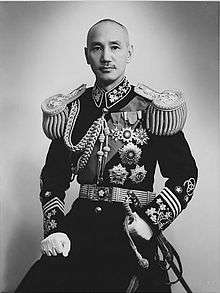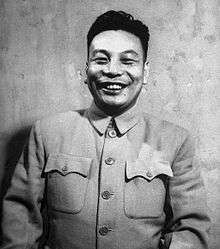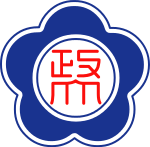National Chengchi University
Coordinates: 24°59′13.17″N 121°34′30.80″E / 24.9869917°N 121.5752222°E
|
國立政治大學 国立政治大学 | |||||||
|
Seal of National Chengchi University | |||||||
| Latin: Universitas Nationalis Chengchi | |||||||
Other name | National University of Governance | ||||||
|---|---|---|---|---|---|---|---|
Former names |
Central School of Party Affairs Central School of Governance Central School of Cadre National Central University of Governance | ||||||
| Motto | 親愛精誠[1] | ||||||
Motto in English | Harmony, Independence, Balance, and Preeminence[2] | ||||||
| Type | Public, National University | ||||||
| Established |
May 20, 1927 in Nanjing | ||||||
Parent institution | Ministry of Education (Taiwan) | ||||||
Academic affiliation | Association of National Universities, Republic of China | ||||||
| Endowment | NTD 6,708,544,000.00 | ||||||
Officer in charge |
Pan Wen-chung (Minister of Education) | ||||||
| President | Edward H. Chow | ||||||
| Vice-president |
Chen Shu-heng Chun-Chig Chang | ||||||
| Founder |
| ||||||
Academic staff | 1,367[1] | ||||||
Administrative staff | 179[1] | ||||||
| Students | 16,247[1] | ||||||
| Undergraduates | 9,736[1] | ||||||
| Postgraduates | 6,511[1] | ||||||
| 963[1] | |||||||
| Location | Taipei, Republic of China | ||||||
| Campus | Suburb, 103 ha (250 acres)[3] | ||||||
| Language | Chinese and English | ||||||
| Colors |
Sky Blue, Earth Red, and Sun White | ||||||
| Athletics |
| ||||||
| Sports | 21 varsity teams | ||||||
| Nickname | Zhèngdà (政大) | ||||||
| Affiliations |
AACSB EQUIS APSIA AAPBS iSchools | ||||||
| Website |
www | ||||||
| National Chengchi University | |||||||
| Traditional Chinese | 國立政治大學 | ||||||
|---|---|---|---|---|---|---|---|
| Simplified Chinese | 国立政治大学 | ||||||
| |||||||
| National Central University of Governance | |||||||
| Traditional Chinese | 國立中央政治大學 | ||||||
|---|---|---|---|---|---|---|---|
| Simplified Chinese | 国立中央政治大学 | ||||||
| |||||||
| Central School of Governance | |||||||
| Traditional Chinese | 中央政治學校 | ||||||
|---|---|---|---|---|---|---|---|
| Simplified Chinese | 中央政治学校 | ||||||
| |||||||
| Central School of Cadre | |||||||
| Traditional Chinese | 中央幹部學校 | ||||||
|---|---|---|---|---|---|---|---|
| Simplified Chinese | 中央干部学校 | ||||||
| |||||||
| University rankings | |
|---|---|
| Global | |
| Times[4] | 801 |
| QS[5] | 701 |
| Asia | |
| Times[6] | 181-190 |
| QS[7] | 95 |
National Chengchi University (Chinese: 國立政治大學; shortened as "政大") is a national co-educational research university located in Taipei. The university was established in Nanjing in 1927, and relocated to Taipei in 1954. It is considered to be one of the most prestigious and important universities of Taiwan. The university, abbreviated as NCCU, specializes in arts and humanities, mass media, social sciences, management, politics, and international affairs programs.[2][8][9] It is the only public university in Taiwan which provides courses in journalism, advertising, radio and television, diplomacy, and several languages which are not taught at other institutions. The name Chengchi (政治) means governance or politics, and refers to its founding in 1927 as an incubator for senior civil service for the Nanjing Nationalist government of China.
History


The school was established in 1927 in Nanjing, which was the capital city of China, as the Kuomintang's Central School of Party Affairs. In 1929, it was renamed to Central School of Governance, after the Kuomintang reunified China in the Northern Expedition campaign. The school was built on the basis of National Central University in Nanjing, which was the highest academic institution of Republic of China. In 1946, it merged with the Central School of Cadre, which was founded in 1944 by the Youth Corps of Three People's Principles in Chongqing. The merged school was named the National Central University of Governance, based in Nanjing. When the Nationalist government lost control of mainland China in 1949, the university's activities were suspended.
The university was reopened in 1954 as National Chengchi University in Taipei by the Executive Yuan, in order to meet the needs of civil service and the growing demands of higher education in post-war Taiwan. Initially only graduates students were admitted, but in 1955, undergraduate students began to be admitted. In 1960, the university awarded the first Doctor of Juridical Science degree in Taiwan. In 1964, the school initiated the first Chinese Master of Business Administration program.
As an incubator for civil service, NCCU is considered one of the most important institutions of the Republic of China, along with the Republic of China Military Academy, which is a prestigious incubator for military leaders. Today, the school is one of the top universities in the Taiwan, and it also has been elected as the "Aim for the Top University Project" sponsored school of the Ministry of Education.
Organization
NCCU has 9 colleges, including colleges of Commerce, Communication, Foreign Languages and Literature, Education, Internaltional Affairs, Law, Liberal Arts, Science, and Social Sciences, 34 departments and 48 graduate institutes.[10][11]
- The College of Commerce is ranked as a top business school by Eduniversal[12] and is accredited by the Association to Advance Collegiate Schools of Business and the European Quality Improvement System.[13]
- The College of Foreign Languages and Literature offers distinctive academic programs on Slavic languages and literature, Arabic languages and literature and Turkish language and culture.
- The College of International Affairs is affiliated with the Association of Professional Schools of International Affairs,[14] with specializations in international relations, East Asian studies and Russian studies.[15]
- The Institute of International Relations is Taiwan's premiere research center on Chinese Communist Party, international security and international relations.[16]
- The Center for Public and Business Administration Education and its adjunct institute, the Center for Civil Service Education, provides training for management personnel in government institutions and public and private enterprises.[17]
- The Department of Diplomacy is the only one of its kind in a university in Taiwan.[18]
- NCCU has recently engaged in the fields of information technology and natural science cooperating with Academia Sinica, National Tsinghua University, and the Ministry of Finance.
College of Liberal Arts
- Chinese Literature
- History
- Philosophy
- Graduate Institute of Library, Information and Archival Studies
- Graduate Institute of Religious Studies
- Master of Arts in Chinese Teaching
- Doctor's and Master's Program in Teaching Chinese as a Second Language Program
- Graduate Institute of Taiwan History
- Graduate Institute of Taiwan Literature
College of Science
- Mathematical Sciences
- Psychology
- Computer Science
- Graduate Institute of Neuroscience
- Graduate Institute of Applied Physics
College of Law
- Law
- Graduate Institute of Law and Inter-discipline
College of Commerce
- International Business
- Money and Banking
- Accounting
- Statistics
- Business Administration
- Management Information System
- Finance
- Risk Management and Insurance
- Graduate Institute of Technology, Innovation and Intellectual Property Management
- Master of Business Administration
- Executive Master of Business Administration
- International Master of Business Administration
College of Communication
- Journalism
- Advertising
- Radio and Television
- International Master’s Program in International Communication Studies
- Master's Program in Digital Content and Technologies
- Voice of NCCU, NCCU Community Radio Station
College of Social Sciences
- Political Science
- Sociology
- Public Finance
- Public Administration
- Land Economics
- Economics
- Ethnology
- Graduate Institute of Development Studies
- Graduate Institute of Labor Research
- Graduate Institute of Social Work
- International Master Program in Asia-Pacific Studies
- International Doctor Program in Asia-Pacific Studies
- International Master's Program of Applied Economics and Social Development
College of Foreign Language & Literatures
- English
- Japanese
- Arabic Language and Culture
- Slavic Language and Literature
- Korean Language and Culture
- Turkish Language and Culture
- European Languages and Cultures
- Graduate Institute of Linguistics
- Master Program of Middle Eastern and Central Asian Studies
- Foreign Languages Center
College of International Affairs
- Diplomacy
- Graduate Institute of East Asia Studies
- Graduate Institute of Russian Studies
- International Master's Program in International Studies
- Master Program of Middle Eastern and Central Asian Studies
College of Education
- Education
- Graduate Institute of Early Childhood Education
- Graduate Institute of Educational Administration and Policy
- Graduate Institute of Teacher Education
- The Teacher In-Service Education Center
Research Center
- Institute of International Relations
- Election Study Center
- Center for the Third Sector
- Center for Creativity and Innovation Studies
- Taiwan Studies Center
- Center for China Studies
- Humanities Center
- Center for Aboriginal Studies
- Center for Mind, Brain and Learning
- Center for the Study of Chinese Religions
Campuses
NCCU's main campus is in the Wenshan District, in the southern part of Taipei. NCCU was awarded the first prize in the Taipei Urban Landscape Award for its campus planning by the city government of Taipei.[19]
Apart from the main campus, there are two branch campuses:
- The Public & Business Administration Education Center on Jinhua Street (金華街) in Da'an District. (大安區)
- The Institute of International Relations on Wanshou Road. (萬壽路)
The affiliated schools are:
- Preschool on Section 2, Zhinan Road. (指南路)
- Experimental Elementary School on Section 3, Zhinan Road. (指南路)
- The Affiliated High School on Zhengda First Street. (政大一街)
One campus under construction:
- Zhinan Village (指南山莊), a former Ministry of Defense campus.
Libraries, exhibition space, and sports centers

There are six Libraries on the main campus and one library in the Center for Public and Business Affairs Education.
Libraries
- Chiang Kai-shek Library, Main Library
- Social Science Information Canter and Sun Yat-sen Memorial Library
- College of Commerce Library
- College of Social Science Library
- College of Communication Library
- Institute of International Relation Library
- Center for Public and Business Affairs Education Library
Museum and Arts Center
- Museum of Ethnology
- NCCU Arts Center
- Exhibition of Future Planning at Main Research Center
Sports Centers
- Main Sports Center
- Swimming Center
- Tennis Court
- Track and Field Stadium
- Riverside Park
- Health Park
- Sports Park
Campus media
There are an academic press, a community radio station, and a local newspaper agency located in NCCU.
Partnership with the Health Care System
In cooperation with the Taipei City Hospital System and National Yang-Ming University, the three institutions formed a Health Care system covering up medical education, healthcare, and management.
NCCU Health Building
- Ground Level: Taipei City Hospital ChengDa Clinic
- Second Level: NCCU healthcare center
- Third Level: NCCU consulting center
International programs
NCCU provides a series of international programs taught in English:
- International Master's Program of Business Administration (IMBA)
- International Master's Program in Asia-Pacific Studies (IMAS)
- International Doctoral Program in Asia-Pacific Studies (IDAS)
- International Master's Program in International Communication Studies (IMICS)
- International Master's Program in International Studies (IMPIS)
- International Master Program of Applied Economics and Social Development (IMES)
Alumni
NCCU faculty and alumni include officials of international governmental organizations, representatives of the National People's Congress and the Chinese People's Political Consultative Conference, officials of the State Council of the People's Republic of China, judges in Supreme People's Court, procurators in Supreme People's Procuratorate, the President of the Republic of China, the Vice President of the Republic of China, the president of Executive Yuan, legislators of Legislative Yuan and the president and the chief justice of the Judicial Yuan. NCCU alumni also include Olympic Games gold medalists.
Alumni Network
NCCU has several hubs globally for students and teachers of NCCU to stay in touch and connect with each other.
| Domestic | Asia and Oceania | America and Europe |
|---|---|---|
Head of state and NCCU
- Chiang Kai-shek: President of the Republic of China; Founder president of the university.
- Chiang Ching-kuo: Executive of Central School of Cadre.
- Lee Teng-hui: Lecturer of Graduate Institute of East Asian Studies.
- Ma Ying-jeou: Associate Professor of Department of Law ; President of the Republic of China,2008-2016
- Tsai Ing-wen: Associate Professor of Department of Law ;President of the Republic of China,2016-2020 (Expected)
- Li Yuan-tsu: Class of 1946, Central School of Governance.
- Vincent Siew: Class of 1965, Department of Diplomacy.
Partnership
NCCU has maintained partnership with 428 academic institutions globally, including exchange students programs, visiting scholar programs, and academic cooperation programs.[20]The partner institutions are in the following countries:
| China | Asia | Oceania | Europe | Africa | America |
|---|---|---|---|---|---|
See also
- Kuomintang
- Communist Party of China
- Central Party School of the Communist Party of China
- Republic of China Military Academy
- Renmin University of China
- Nanjing University
References
- 1 2 3 4 5 6 7 "About NCCU". National Chengchi University (in Chinese). Retrieved 2015-12-22.
- 1 2 "About NCCU". National Chengchi University. Retrieved 2015-12-22.
- ↑ "NCCU Campus". International MBA, College of Commerce. National Chengchi University. Retrieved 2015-12-22.
- ↑ "World University Rankings 2016-2017". Times Higher Education. 2015. Retrieved October 22, 2016.
- ↑ "QS World University Rankings 2016/17". Quacquarelli Symonds Limited. 2016. Retrieved September 8, 2016.
- ↑ "Asia University Rankings 2016". Times Higher Education. 2016. Retrieved 11 July 2016.
- ↑ "QS University Rankings: Asia 2016". Quacquarelli Symonds Limited. 2016. Retrieved July 11, 2016.
- ↑ "National Chengchi University Rankings". QS Top Universities. London: QS Quacquarelli Symonds. 2015. Retrieved 2015-12-22.
- ↑ "National Chengchi University, Taiwan (Exchange Program)". University of Connecticut. Mansfield, Connecticut. 2015. Retrieved 2015-06-12.
National Chengchi University (NCCU), located in the capital city of Taipei, is a comprehensive public university, ranked first in Taiwan in the field of Social Sciences, Business, Communication and International Relations in Taiwan. It is also regarded as the best place in Taiwan to study Mandarin.
- ↑ "NCCU at a Glance". International Admission. National Chengchi University. Retrieved 2015-08-25.
- ↑ "National Chengchi University (NCCU) Profile". Study in Taiwan. Taipei. 2015-02-12. Retrieved 2015-06-12.
- ↑ "National Chengchi University College Of Commerce". Eduniversal Business Schools Ranking. Retrieved 2015-12-22.
- ↑ "EQUIS Accredited Schools". European Foundation for Management Development. Retrieved 2015-12-22.
- ↑ "National Chengchi University". Association of Professional Schools of International Affairs. Retrieved 2015-12-22.
- ↑ "College of International Affairs". National Chengchi University. Retrieved 2015-12-22.
- ↑ "Institute of International Relations". National Chengchi University. Retrieved 2015-12-22.
- ↑ "Center for Public and Business Administration Education". National Chengchi University. Retrieved 2015-12-22.
- ↑ "Department of Diplomacy". National Chengchi University. Retrieved 2015-12-22.
- ↑ "Taipei Urban Landscape Award recipients unveiled". Taiwan Today. Ministry of Foreign Affairs, Republic of China (Taiwan). 2014-11-20. Retrieved 2015-12-22.
- ↑ "Partner Universities of National Chengchi University". Office of International Cooperation. National Chengchi University. Retrieved 2016-06-03.
External links
- Official website
- NCCU International Association at Wordpress
- National Chengchi University on Facebook
- National Chengchi University on Sina Weibo
- National Chengchi University on Google+
- National Chengchi University, at ResearchGate
- National Chengchi University, at LinkedIn
